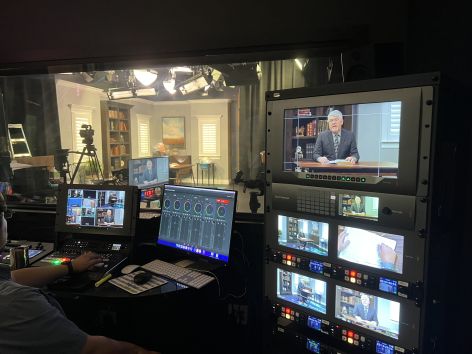The Meaning of Matthew 24:14: The Gospel Preached to the Whole World?
Christ’s prophecy 2,000 years ago has great significance for the current generation. What can we learn from Jesus’ statement in Matthew 24:14?

What does Matthew 24:14 Say?
“And this gospel of the kingdom will be preached in all the world as a witness to all the nations, and then the end will come.”
“And this gospel of the kingdom will be preached in all the world as a witness to all the nations, and then the end will come” (Matthew 24:14).
The disciples had asked Jesus how they could know if His return and the end of the age was close. In response, Jesus gave them several items to look out for. Among them was this prophecy that the gospel would be preached everywhere.
First, what is the gospel?
Ask professing Christians if they believe the gospel, and they will almost certainly say yes. But ask, “What is the gospel according to the Bible?” and chances are the answer will be incomplete at best.
As strange as it may seem, the Bible is not the source for several so-called Christian beliefs, including the common definition of the gospel. Instead, such man-made traditions are passed down unquestioningly from generation to generation and many believe a “different gospel” (Galatians 1:6-9). This was true 2,000 years ago, and it is true today.
Notice what Mark 1:14 tells us about the gospel Jesus brought: “Jesus came to Galilee, preaching the gospel of the kingdom of God” (emphasis added throughout).
The gospel of the Kingdom of God is the good news about the coming age when the world will be governed directly by God. Contrary to what some teach, the Kingdom of God is not a church or denomination. It is not a sentimental feeling in your heart or a destination in heaven for good people.
The gospel of the Kingdom of God is the good news about the coming age when the world will be governed directly by God.
The Kingdom of God is the government of God that will be established on earth at Jesus Christ’s return. Jesus taught that He will be King and His followers will rule alongside Him on earth as immortal spirit beings (1 John 3:2; Revelation 5:10).
That Kingdom will reign on earth (Matthew 5:5) and result in humanity thriving like never before. (To learn more about the Bible’s teaching on the Kingdom, read “What Is the Kingdom of God?”)
Jesus shared this vision with His followers and instructed them on how to be a part of it. To complete His mission, He had to make these teachings clear to His disciples (Mark 4:11; John 17:14).
This prophecy does not diminish the truth that Jesus Christ is our Savior or that His role is crucial to the gospel message (1 Corinthians 15:1-5). It is because He is the Savior that this future Kingdom of God will be established. His sacrifice made forgiveness of sins possible and opened the door to eternal life in the Kingdom.
Everything Christ accomplished on earth at His first coming is wonderful news to those who believe. Still, the thrust of His message has to do with the glorious future for mankind—the opportunity to be in His Kingdom and inherit the universe (Revelation 21:7).
“Preached in all the world”
Preaching the gospel is part of the mission of the Church. From ancient times to the present day, God has used human representatives to convey His divine message.
Jesus promised that His Church would endure (Matthew 16:18), though it would be a little flock, often with little strength. Still, the gospel message has continued to be available through the efforts of Christ’s followers (Mark 16:15-16).
At first glance, this prophecy in Matthew 24:14 seems to be only an anticipation of Jesus’ later instructions to His disciples: “You shall be witnesses to Me in Jerusalem, and in all Judea and Samaria, and to the end of the earth” (Acts 1:8).
The development of radio, television, smart devices, the Internet and wireless access—all feats of the 20th and 21st centuries—have played a role in the modern fulfillment of this prophecy.
However, a closer look at both of these scriptures shows Jesus’ prophecy applied far beyond the time of the apostles.
Consider this: Did the apostles ever reach “all the world”—or, for that matter, “the end of the earth”—in their day with the tools they had available?
Tradition has it that the apostles quickly dispersed and covered a lot of ground preaching the gospel, but it would be difficult to argue that they fulfilled the entirety of this commission with first-century technology.
It’s not their fault; they were physically limited in what they could accomplish.
And through the centuries, the persecuted Church had little ability to reach the whole world.
But now, more than at any other time in human history, the gospel can travel virtually anywhere. The development of radio, television, smart devices, the Internet and wireless access—all feats of the 20th and 21st centuries—have played a role in the modern fulfillment of this prophecy.
The groundwork for preaching the gospel to “all the world” has already been established through our technological infrastructure.
What Jesus said is actively being fulfilled before our very eyes.
“As a witness”
Why preach the gospel? Is it to save as many people as possible before they’re sentenced to hell, as many in the Christian world believe?
Jesus gave the plain answer: the gospel is preached for a witness. A witness is a declaration of facts, not an aggressive attempt to shove beliefs down someone’s throat or to force people to respond.
This has serious implications for how Jesus’ followers preach the gospel today. This aspect of the Church’s commission is similar to what God told Ezekiel:

The “Life, Hope & Truth Presents” video program is one of many methods the Church of God, a Worldwide Association is preaching the gospel to the world today.
Ezekiel was to relay what God gave Him to say, but whether his audience responded was outside of his control.
Similarly, preaching the gospel as a witness includes trumpeting what is ahead for mankind—the blessings of obeying the message and the cursings for disobeying it.
But underpinning those efforts is the realization that even the most eloquent and logical-sounding preacher cannot make people respond. God must first open the human mind to comprehend and understand the gospel (John 6:44). Repentance, faith and baptism all hinge on whether God takes this action in someone’s life.
(To listen to a short commentary on Jesus’ words in John 6:44, listen to our “Verse by Verse” podcast episode “No One Can Come to Me Unless the Father Draws Him (John 6:44).”)
Until God brings about this change of heart, the gospel will continue to be “a witness” to most who hear it. When their minds are eventually opened, the memory of initially rejecting the message will become a starting point for embracing the gospel. Then they will finally realize they need God’s help.
The other part of the Church’s commission is found in Matthew 28:19-20:
“Go therefore and make disciples of all the nations, baptizing them in the name of the Father and of the Son and of the Holy Spirit, teaching them to observe all things that I have commanded you; and lo, I am with you always, even to the end of the age.”
Thankfully, God will call more followers and bless the Church’s efforts to preach the gospel. See more in our article “What Is the Mission of the Church?”
“And then the end will come”
Jesus promised the end would come once the gospel message reached the entire world.
While the Church of God strives to take the gospel to every corner of the earth possible, this prophecy will ultimately be fulfilled in two ways:
- The two witnesses: Revelation 11 shows that two individuals will be chosen by God to deliver what might be the most powerful testimony against humanity ever witnessed. We’re told, “These have power to shut heaven, so that no rain falls in the days of their prophecy; and they have power over waters to turn them to blood, and to strike the earth with all plagues, as often as they desire” (verse 6).
Also, the description of these two witnesses includes a note that they spew fire out of their mouths and consume anyone who wants to hurt them (verse 5). Their unusual ministry lasts approximately 3½ years and ends just before Christ returns. (To learn more about these men, read “Two Witnesses of Revelation 11.”) - The angel in Revelation 14: John prophesied about another witness in the form of an angel. Notice: “Then I saw another angel flying in the midst of heaven, having the everlasting gospel to preach to those who dwell on the earth—to every nation, tribe, tongue, and people—saying with a loud voice, ‘Fear God and give glory to Him, for the hour of His judgment has come; and worship Him who made heaven and earth, the sea and the springs of water’” (verses 6-7). Nothing else is said in the Bible about how this will be fulfilled; all we know is that the angel points everyone to the existence of the true God and gives one final warning to repent.
Based on these and other passages, the pattern is clear: God provides a warning to humanity before taking dramatic action.
Will humanity in general listen to the warning from the Church or the two witnesses or the angel? Not according to the Bible, and they will suffer deeply for their refusal (Revelation 16:11). In this regard, the end-time generation—like that of Noah’s time—will be caught off guard and devastated.
“For as in the days before the flood, they were eating and drinking, marrying and giving in marriage, until the day that Noah entered the ark, and did not know until the flood came and took them all away, so also will the coming of the Son of Man be” (Matthew 24:38-39).
Will you respond to the gospel?
God is patient and merciful, but He is also just. The prophecy in Matthew 24:14 confirms that God will again give humans multiple opportunities to heed the gospel and repent of their sinfulness.
Sooner or later, when God intervenes dramatically, a succession of events will take place that will culminate in the return of Jesus Christ.
Let’s aspire to be ready for that moment, just as the apostle John said, “Little children, abide in Him [by believing the gospel], that when He appears, we may have confidence and not be ashamed before Him at His coming” (1 John 2:28).
To learn more about the prophecy of Matthew 24:14, read “This Gospel Will Be Preached.”
Photo credit: iStock.com/enot-poloskun
Date Posted: September 16, 2024



